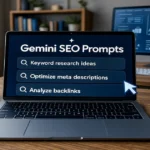Unlock Your SEO Success: The Ultimate SEO Vocabulary Guide
I was stuck.
No matter what I tried, my website wasn’t getting found. My traffic was stagnant. Engagement was low. It felt like shouting into a void.
Then, everything changed when I learned the secret.
It’s all about SEO vocabulary.
Understanding the right terms can transform how you approach search engine optimization. Without it, strategies become guesswork. With it, you gain clarity, precision, and results.
In this blog, I’ll share my journey, the essential SEO vocabulary you must know, and actionable tips to boost your traffic and engagement.
Why SEO Vocabulary Matters
SEO is often seen as technical and complicated. Many beginners get overwhelmed by jargon like “CTR,” “KD,” or “long-tail keywords.”
Here’s the truth:
- You don’t need to memorize everything.
- You don’t need fancy terminology.
- But you do need to understand the fundamentals.
Knowing SEO vocabulary helps you:
- Communicate clearly with marketers and developers.
- Understand performance metrics to make smarter decisions.
- Optimize your content so it ranks higher and reaches your audience.
Think of SEO vocabulary as the map to navigate the search engine world. Without it, you’re driving blind. With it, you can reach your destination faster.
45+ Essential SEO Vocabulary Terms You Must Know
Here’s the list I personally use to boost traffic and engagement. Learn these, and you’ll speak the language of SEO like a pro.
- SERP (Search Engine Results Page) – The page Google shows after a search.
- CTR (Click-Through Rate) – The percentage of people who click your link after seeing it.
- Impressions – The number of times your site appears in search results.
- Organic Traffic – Visitors who come to your site naturally, not via ads.
- Bounce Rate – Percentage of visitors who leave after viewing one page.
- Session Duration – Average time users spend on your site.
- KD (Keyword Difficulty) – How hard it is to rank for a keyword.
- Long-Tail Keywords – Highly specific phrases with lower competition.
- Indexing – The process of adding a page to Google’s database.
- Backlinks – Links from other websites pointing to your site.
- Domain Authority (DA) – A score predicting how well a site ranks.
- Page Authority (PA) – Predicts the ranking potential of a specific page.
- Meta Title – The clickable title that appears in search results.
- Meta Description – Summary of your page that appears in results.
- Alt Text – Description of images for search engines.
- Anchor Text – The clickable text of a hyperlink.
- Canonical URL – The preferred URL of a page to prevent duplicates.
- Robots.txt – A File that tells search engines which pages to crawl.
- Sitemap – A map of your site to help search engines index pages.
- Noindex – Tag to prevent a page from being indexed.
- Schema Markup – Code that helps search engines understand content.
- Featured Snippet – Highlighted answer at the top of search results.
- Internal Linking – Links within your own website.
- External Linking – Links pointing to other websites.
- URL Structure – How your page URLs are organized.
- LSI Keywords – Keywords related to your main keyword.
- Content Audit – Reviewing content to improve performance.
- Crawling – How search engines discover your pages.
- Duplicate Content – Content repeated across pages.
- Keyword Cannibalization – When multiple pages compete for the same keyword.
- White-Hat SEO – Ethical SEO techniques.
- Black-Hat SEO – Risky, unethical SEO tactics.
- Gray-Hat SEO – Techniques that fall between ethical and unethical.
- Page Load Speed – How fast a page loads.
- Mobile-Friendly – Optimized for mobile devices.
- Core Web Vitals – Google metrics to measure user experience.
- CTR Optimization – Improving the click-through rate.
- Conversion Rate – Percentage of visitors who complete a goal.
- Content Gap Analysis – Identifying missing content opportunities.
- Traffic Sources – Where your visitors come from.
- Referral Traffic – Visitors from other websites.
- Organic Search – Non-paid search traffic.
- Paid Search – Traffic from paid ads.
- SEO Audit – Reviewing a website’s SEO performance.
- Rank Tracking – Monitoring positions of keywords in search results.
Mastering these terms is the first step to improving your online presence.
How Understanding SEO Vocabulary Boosted My Career
When I learned SEO vocabulary, everything changed:
- My traffic grew.
- My engagement soared.
- I started ranking for long-tail keywords that actually converted.
The secret isn’t just memorizing terms. It’s about:
- Using plain language – Speak in ways your audience understands.
- Providing genuine value – Solve real problems, don’t just stuff keywords.
- Analyzing metrics – Track CTR, bounce rate, and session duration to see what works.
Once you master these fundamentals, SEO stops feeling like a guessing game. You know exactly what to do to grow your audience.
Plain Language Over Fancy Vocabulary
Many marketers get lost in jargon. They throw around terms like “canonical URL” or “LSI keywords” without explaining.
Here’s my advice:
Forget the fancy vocabulary. Focus on plain language that your audience understands. Write content that actually helps people. That’s the real strategy behind SEO success.
Even if your technical skills are limited, understanding SEO vocabulary lets you:
- Work with developers confidently.
- Optimize content without confusion.
- Measure performance clearly.
Actionable Tips to Apply Your SEO Vocabulary Knowledge
- Audit your existing content – Check if it aligns with your keywords and audience needs.
- Target long-tail keywords – Use the ones with high relevance and low competition.
- Monitor SERP metrics – CTR, impressions, and ranking positions give you feedback.
- Optimize meta tags – Use meta titles and descriptions that attract clicks.
- Improve internal linking – Guide users to related pages to boost session duration.
- Use schema markup – Help search engines understand your content better.
- Track performance consistently – Use tools like Google Analytics and Search Console.
By combining knowledge of SEO vocabulary with practical application, you create a roadmap for success.
FAQs About SEO Vocabulary
Q1: What is the most important SEO vocabulary term to know?
A: It depends on your goals, but understanding keywords, CTR, and organic traffic is essential for beginners.
Q2: How can I remember all these SEO terms?
A: Start with the 10–15 most relevant terms for your business. Gradually expand as you optimize your content.
Q3: Is SEO vocabulary different from SEO strategy?
A: Yes. Vocabulary is the language. Strategy is how you apply it to get results. You need both to succeed.
Q4: Do I need technical skills to use SEO vocabulary effectively?
A: No. You just need to understand the terms and apply them in content planning, analytics, and optimization.
Q5: Can SEO vocabulary improve my traffic?
A: Indirectly, yes. By understanding terms like CTR, bounce rate, and long-tail keywords, you can optimize your content to perform better in search engines.
Final Thoughts
Learning SEO vocabulary was a game-changer for me. It helped me understand what drives search engine success, communicate better with experts, and optimize content for real results.
Curious about smart transportation and digital growth? Head over to Digital Pracer’s blog and explore content that keeps you ahead of the curve!








